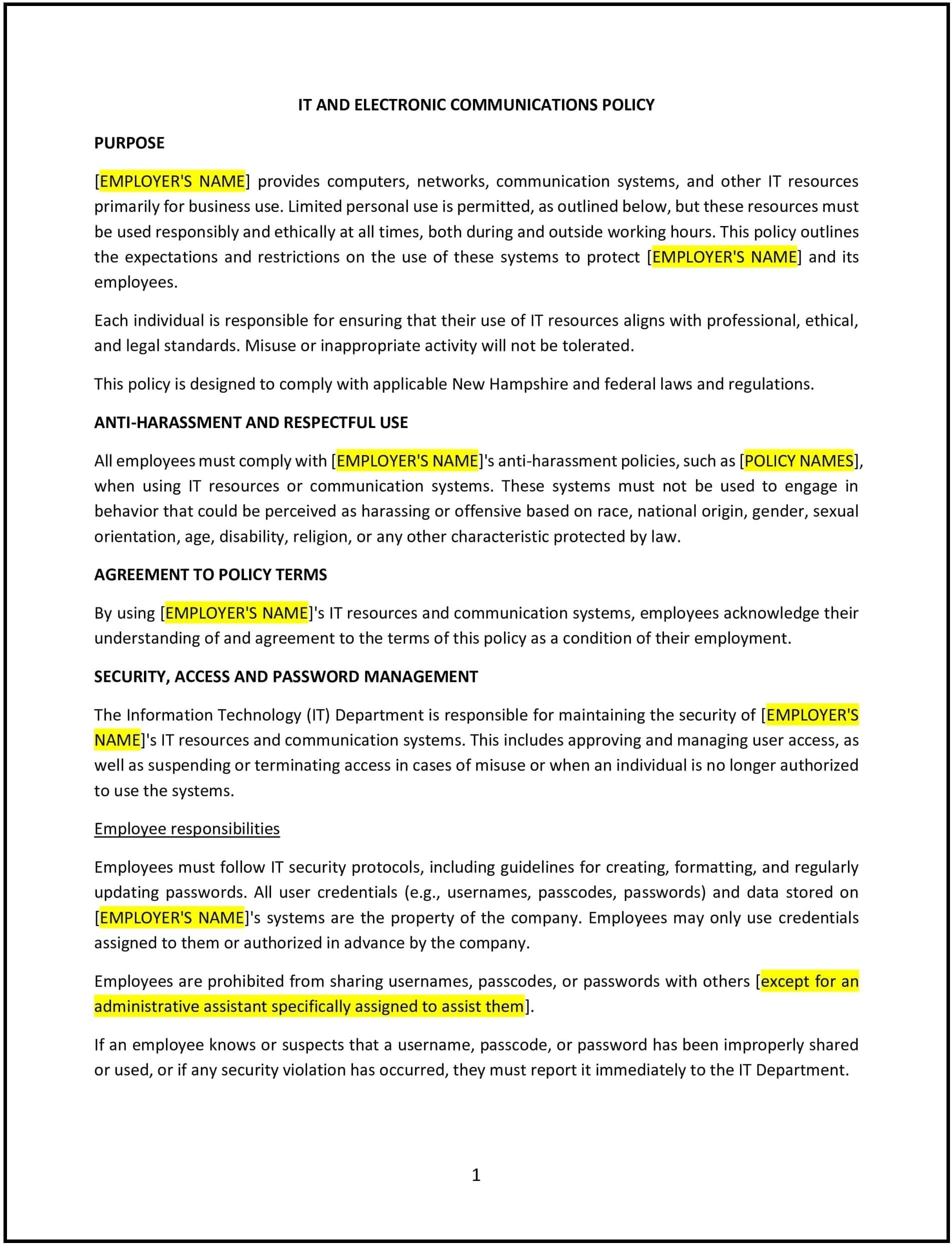IT and electronics communications policy (New Hampshire): Free template
Got contracts to review? While you're here for policies, let Cobrief make contract review effortless—start your free review now.

Customize this template for free
IT and electronics communications policy (New Hampshire)
An IT and electronics communications policy helps New Hampshire businesses manage the appropriate use of technology and electronic devices in the workplace. This policy outlines acceptable and unacceptable behaviors for using computers, email, mobile phones, and other electronic systems, ensuring the security, efficiency, and integrity of company operations.
By adopting this policy, businesses can prevent misuse of company devices, protect sensitive data, improve productivity, and ensure that employees are aware of their responsibilities when using electronic communication systems.
How to use this IT and electronics communications policy (New Hampshire)
- Define acceptable use: Outline what constitutes appropriate use of company IT resources, including computers, mobile devices, email, and internet access. Specify whether employees can use these systems for personal use, and under what conditions.
- Set guidelines for email and internet use: Establish rules for using email and the internet during work hours, including prohibiting the use of company resources for illegal activities, harassment, or excessive personal use.
- Address data security: Specify how employees should handle sensitive information, such as passwords, proprietary data, and confidential communications. Set expectations for securing company devices, including using encryption, firewalls, and regularly updating software.
- Monitor IT usage: Explain the company's right to monitor and access employee electronic communications, including emails, internet usage, and activities on company devices, while maintaining employee privacy within legal limits.
- Prohibit unauthorized software and hardware: Prohibit employees from downloading unauthorized software, installing unapproved hardware, or connecting personal devices to the company’s network without proper authorization.
- Provide mobile device guidelines: Set clear rules regarding the use of mobile devices in the workplace, including expectations for safeguarding company information, using encryption, and ensuring that devices are used for business purposes.
- Define consequences for policy violations: Outline the potential consequences for violating the IT and electronics communications policy, including disciplinary action or termination, depending on the severity of the violation.
- Review and update: Regularly review and update the policy to reflect changes in technology, security threats, or legal regulations to ensure continued effectiveness.
Benefits of using this IT and electronics communications policy (New Hampshire)
This policy provides several benefits for New Hampshire businesses:
- Protects company data: By establishing clear guidelines for data security, businesses can reduce the risk of data breaches, leaks, or unauthorized access to sensitive company information.
- Increases productivity: By setting expectations for appropriate technology use, businesses can minimize distractions and prevent the misuse of company devices, which can lead to decreased productivity.
- Ensures legal and regulatory compliance: A well-defined policy helps businesses comply with laws and regulations regarding electronic communication, data privacy, and cybersecurity.
- Prevents misuse of IT resources: By clearly defining acceptable and unacceptable use, businesses can prevent the misuse of company resources for personal, illegal, or harmful purposes.
- Maintains network integrity: Ensuring that only authorized software and devices are used on the network helps protect the company from malware, viruses, and other cybersecurity threats.
Tips for using this IT and electronics communications policy (New Hampshire)
- Communicate the policy clearly: Ensure all employees are aware of the policy, understand the rules, and acknowledge that they will comply with the company’s IT and electronics guidelines.
- Provide training: Offer training on data security, acceptable use, and the importance of maintaining secure electronic communications, helping employees understand the risks and best practices.
- Monitor IT usage responsibly: While businesses have the right to monitor usage, they should balance this with respect for employee privacy, ensuring that monitoring is done within legal boundaries.
- Implement strong security measures: Ensure that employees follow best practices for securing company devices, such as using strong passwords, two-factor authentication, and regularly updating software.
- Address violations promptly: If an employee violates the policy, address the issue swiftly and consistently, applying appropriate consequences based on the severity of the violation.